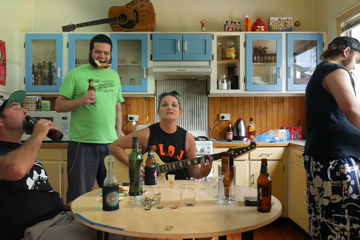Before the written word, before music, before art, before mankind devised the myriad of methods now at our disposal for immortalising our culture, we were a species of storytellers. From long before recorded history first began to chronicle our evolving civilisation, we spoke our stories aloud and passed them onto following generations.
This tradition of storytelling can be found the world over in virtually every proto-society from prehistory, and while separated by time and geography, they all share one common trait: the transformation of folklore into dogma. Through thousands of retellings, fiction became spiritual fact. Regardless of how remote those ancient peoples might appear to our electrically powered 21st-century way of life, the endurance of religion in its various guises speaks to one immutable truth: the presence of the otherworldly and the divine has always been an inevitable consequence of our human capacity for telling tales.
But what might happen if mankind was thrust back into a world where our sole form of expression was storytelling? What narratives would we return to and what faiths might they eventually spawn? American playwright Anne Washburn attempts to answer this question in her dystopian pop-culture parable Mr Burns, a post-electric play. Forget Shakespeare, Dickens or Keats - come the apocalypse, it's The Simpsons that will survive.
"When I first read it I thought, 'I don't even know what this is.' It's deeply strange on a first reading," admits Imara Savage, who has directed the first Australian staging in a co-production between Adelaide's State Theatre Company of South Australia, and Sydney's Belvoir Theatre, alongside choreographer Lucas Jervies. Set over three epochs following a global catastrophe, Mr Burns begins in the immediate aftermath of a nuclear armageddon, as survivors find common ground in the world's longest-running animated series. Seven years on, the second part sees this ragtag group become a troupe of actors, performing old episodes of The Simpsons for the fledgling society that has emerged from the destruction. The final scene, some 75 years further in the future, reveals a neo-medieval civilisation that has elevated everyone's favourite dysfunctional family to the level of deities. No longer mere cartoons, this once buffoonish cast of yellow-skinned characters are now the stuff of legend, held up as the ultimate totems of morality. Hallowed be thy Bart.

Don't miss a beat with our FREE daily newsletter
Bizarre as this synopsis may sound, for Savage, Mr Burns' strangest quality is how potentially plausible it is. "The connection I kept making in my mind was to Japan. In the play, we see how stories are malleable to the context in which they are told, and so the pop culture of Japan, post-Hiroshima and Nagasaki, is an interesting example," she explains. "You see the emergence of Godzilla and that repeating idea of gigantic, unstoppable forces destroying cities, and it shows just what a lasting thumbprint those events can leave on a place's cultural DNA. It shows how that anxiety and fear has manifested through 75-years of storytelling."
In the almost three decades it's been on the air, The Simpsons has shown a knack for being uncannily prophetic, predicting among other things, the Siegfried and Roy tiger mauling, rigged voting machines, and perhaps most unnervingly, the ascendency of President Trump. However, rather than foretelling the coming end of days, the cautionary tale found in Mr Burns is more a philosophical portent - one that has an added sting given the recent slashing of arts journalism budgets in the mainstream media.
"One of the most useful things I read when I first began thinking about how to approach Mr Burns was a quote from Anne Washburn herself. She said, 'It's not a play about The Simpsons. It's a play about a group of people for whom The Simpsons is important.' And I think that really focuses the idea that this is a play about how storytelling is so vital to our understanding of our culture and identity," Savage shares. "Mr Burns was written post-September 11, and it's essentially asking the question, what is the role of the artists in a climate of destruction? I think Washburn was probably asking that of herself - 'what is my role in these times?' And I think, really crucially, it's asking what is the role of the storyteller in terms of healing, in terms of legacy, in terms of the way we warn subsequent generations not to repeat the mistakes of the past?"
While devotees of The Simpsons will no doubt get a kick out of seeing much-loved characters brought to life on stage, albeit in a rather surreal setting, Savage has been struck by how complex and intellectually provocative these pop culture stalwarts become in Mr Burns. "Somebody described the play in rehearsals the other day as, 'A Russian doll of meta-intertextuality!' And I was like, 'Yeah, that's true.'" Savage laughs. "There are so many layers at work. It's a piece of theatre; it's a pop-operetta; it's a morality play; there's even a moment of great tragedy. As a director, it's hard to layer anything else on top of that - there's already so much in it, that in a way, my job is to illuminate all that detail."
Belvoir Theatre and State Theatre Company of South Australia presents Mr Burns: A Post-Electric Play, 19 May — 25 Jun at Belvoir St Theatre















